新概念英语第二册第89课课件
新概念英语第二册89课
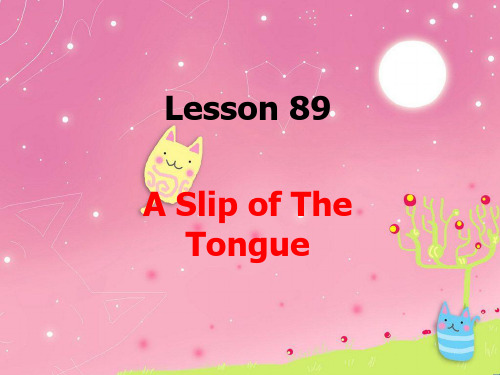
Keys
1.D 2.C 3.A 4.C 5.B 6.B
典型例题
3.He paid for a seat, when he ______ have entered free. A. could B. would C. must D. need
典型例题
4.I didn’t see her in the meeting room this morning. She ______ at the meeting . A. mustn’t have spoken B. mightn’t have spoken C. can’t have spoken D. shouldn’t have spoken
advertiser
comedy
dull
artiste
tragedy
queue
Watch the video
D289(流畅).f4v 1.What would be presented at our local cinema? 2.How was the show? 3.Who did not come? 4.What was the only funny thing?
Lesson 89 A Slip of The Tongue
New words and expressions
slip n. 小错误 comedy n. 喜剧 present v. 演出;adj. 出席,到场的 queue v. 排队 dull adj. 枯燥,无味 artiste n. 艺人 advertiser n. 报幕员
经典例题
Mr. White _____ at 8:30 for the meeting , but he didn’t’ show up. A. should have arrived B. should arrive C. should have had arrived D. should be arriving
新概念第二册-Lesson 89 A slip of the tongue
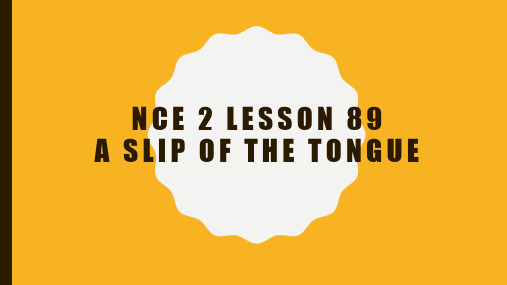
the poor man should have said, but what he actually said was: 'This is 实际已经做来。
the Poo and Ee Seed Bird Company. Good ladies, evening and
gentlemen!"
GRAMMAR REVIEW: 时间状语从句
beginning of the programme. He was obviously very nervous and for 要感到失望。
some minutes stood awkwardly before the microphone. As soon as need后接不定式的完成
he opened his mouth, everyone burst out laughing. We all know what 式表示不必做某事而
参考译文 - A SLIP OF THE TONGUE 口误
人们总要想尽办法看不花钱的演出——哪怕是拙劣的演出。当“皮尤” 鸟食公司将在我们当地影院演出喜剧节目的消息传开后,我们都赶紧 跑去观看。我们不得不排了好几个小时才进得场去。在演出开始前场 内肯定已有好几百人了。不幸的是,这次演出是我们看过的最乏味的 演出了。那些没能进到场内的人没有必要感到失望,因为很多应该出 场的专业演员都没有来。那天晚上唯一有趣的事情是节目开始时那个 报幕员的开场白。他显然非常紧张,局促不安地在麦克风前站了好几 分钟。但他刚一开口说话,人们便哄堂大笑起来。我们都明白那个可 怜的人应该说些什么,而他实际说的却是:“这是‘浦伊’鸟食公司, 好女士们,晚上和先生们!”
COMEDY
comedy /ˈkɒmədi/ n. 喜剧, ;幽默 a TV comedy series 电视喜剧连续剧 -柯林斯高阶英语词典 E.g. He performs standup comedy every Saturday. 他每周六表演单口相声。 E.g. At last he saw the comedy of the situation and laughed. 他最后看出这一场面的喜剧性, 于是笑了. -《简明英汉词典》
新概念2第89课
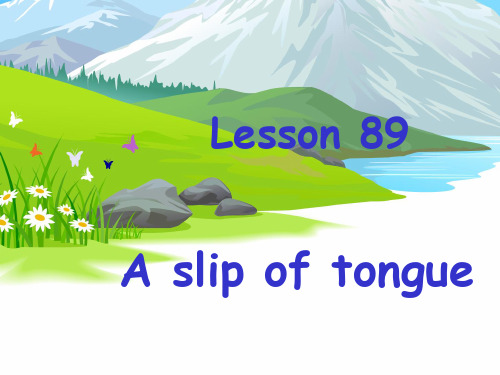
Text-reading
People will do anything to see a free show -- even if it is a bad one.
anything用于肯定句时表示“不论什么,任何事情”,to see a free show 表 示目的,也可以用for +名词形式:
在英国,他经常会因跟别人说话的时的那些令人难堪的话语被嘲笑。
He once told the President of Nigeria, who was dressed in traditional clothes, “You look like you’re ready for bed。”
他曾经跟身着民族服饰的尼日利亚总统说:“你看起来正准备要去 睡觉。”
must have done对过去的肯定的猜测
如: It must have rained last night, for the ground is wet. You must have been mad to speak to the servant.
Those who failed to get in need not have felt disappointed, as many of the artistes who should have appeared did not come.
In 2004, he mistakenly suggested that he was out to harm h i s o w n c o u n t r y : “ O u r e n e m i e s a re i n n o v a t i v e a n d resourceful, and so are we。 2004 年他有次口误竟说他伤害了他自己的国家:“我们的敌人是 革新和谋略,我们也是国家的敌人。
新概念第二册89课
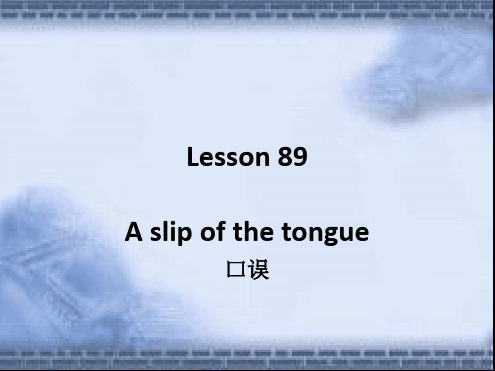
消息传遍了整个学校。 ? rush to / into 仓促行动、冒冒失失地做某事 ? 例句:1)Don't rush to conclusions. 不要急于
下结论。 ? 2)She rushed into the room . 她冲进了房间。
有点隐痛。 ? (4) adj. (刀等) 钝的 ? a dull knife 钝刀
? 5. Those who failed to get in need not have felt disappointed, as many of the artistes who should have appeared did not come.
Lesson 89
A slip of the tongue
口误
? slip ? comedy ? present ? queue ? dull ? artiste ? advertiser ? disappointed ? obviously ? nervous ? awkwardly
单词学习
? n. 小错误 ? n. 喜剧 ? v. 演出;adj. 出席,到场的 ? v. 排队 ? adj. 枯燥,无味 ? n. 艺人 ? n. 报幕员 ? adj. 失望的 ? adv. 明显地 ? adj. 紧张的 ? adv. 尴尬地
bus.
? must have done 对过去事情的肯定判断
? 例句:I enjoyed the performance because I had a very good seat in the fifth row. 我可以好好欣 赏表演,因为在第五排的座位很好。
第二册新概念英语NCE2_Lesson89 A slip of the tongue(共23页)最新精品课件.ppt
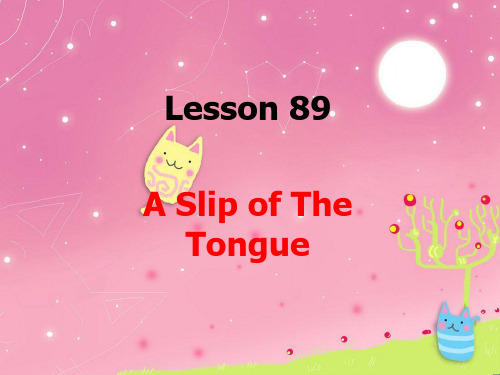
Keys
1.D 2.C 3.A 4.C 5.B 6.B
jump a queue
横队:row
advertiser
comedy
dull
artiste
tragedy
queue
Watch the video
D289(流畅).f4v 1.What would be presented at our local
cinema? 2.How was the show? 3.Who did not come? 4.What was the only funny thing?
slip n. 小错误,失误,疏漏 a slip of the tongue /pen make a slip of tongue slippers n.拖鞋
comedy n. 喜剧
This comedy has had them rolling in the
aisles for two weeks. 这出喜剧让观众们连续两个星期乐得前仰后合。
I prefer comedy to tragedy.
我喜欢喜剧而不喜欢悲剧。
present adj. 出席的, 现在的, 当前的
He insists on being present.
n.目前 at present
v.演出,送,提出, 赠 呈现
He presented quite a new view of the affair.
A. should have arrived [解析]本题中的一个关键词but暗示了“Mr. White按道理理
应到了,而他没有到”。故答案选[A]。
As you worked late yesterday, you_________ have come
新概念二册89-90PPT

• 8.cod n. 鳕鱼 • C.O.D.= cash of delivery • 货到付款 • 9.crew n. 全体工作人员(集合 全体工作人员( 名词,用法和people一样) 一样) 名词,用法和 一样 Deep-sea cod Fort
• 复习have的用法, 参见L18,42和66的关键句型 ppt
Lesson 89 A slip of the tongue
words
• 1. slip n. 小错误 犯一个错误 make a slip v. 滑倒 slip(slipped slipped) ( ) • 2. comedy n. 喜剧 comedian n. 喜剧演员 tragedy n. 悲剧
Questions
• 1. Why does fish become more and more expensive? Because the oceans was overfished. 2. What are the factors that caused these fish to grow so large? The warmth from oil-pipes, the plentiful food and the absence of fishing.
An advertiser of the show. • 4. What is the funny joke /thing in this passage? The advertiser made a slip of the tongue. • 5. What is the correct word order of the last sentence? “This is the P. and U. Bird Seed Company. Good evening, ladies and gentlemen.”
新概念英语第二册Lesson 89 (共68张PPT)
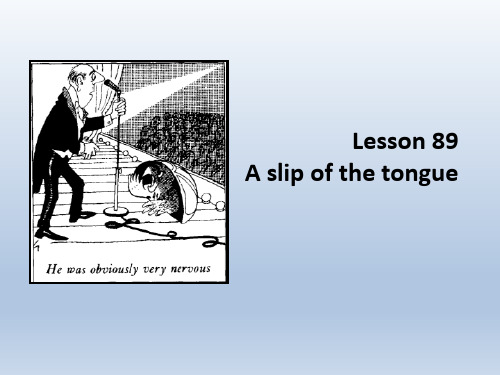
New words and expressions
dull adj.
not interesting or exciting 枯燥,无味
Text
free and single:
The people are free to choose who will govern them. (自由) Is she still single? I thought she was going to get married last April. (独身)
Comprehension questions
We all rushed to see it, didn't we? Yes, we did.
Comprehension questions
How long did we have to queue to get in? For hours.
Comprehension questions
Understand the situation
T: What do you think is happening in the picture?
Listening objective
T : Who made the only funny joke that evening and why? Answer : The advertiser who presented the programme. Because he was very nervous.
New words and expressions
新概念二册Lesson 89课件 (共50张PPT)
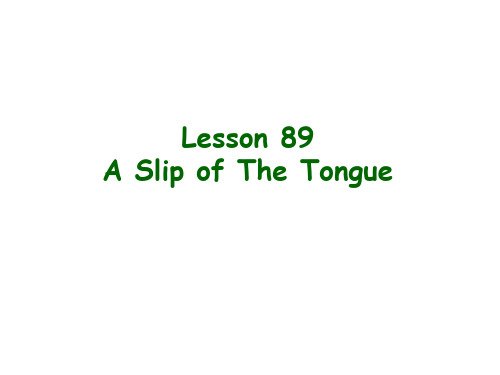
slip
1)n. 小错误,失误,疏漏 make a slip 犯一个小错误 a slip of the tongue /pen 2)v滑,滑倒 slide The hammer slipped,and he hurt his finger. I slipped on the icy road and broke my right leg. 3)遗忘,忽略 slip one's mind/memory=forget slippers n.拖鞋
artiste [ɑ:ˈti:st] n.艺人,职业表演 者
artist [ˈɑ:tɪst] n.艺术家,美术家
advertiser
n.报幕员,刊登广告的人 advertisement(ad) n.广告宣传 Put an advertisement in the paper advertisement column 广告栏
1.想方设法去做… 2.即使,虽然 3.消息传开 4.喜剧节目 5.进入,收割 6.未能 7.本来不必 8.在…开始 9.突然笑了起来
• 1.do anything to… • 2.even if • 3.the news gets round • 4.a comedy show • 5.get in • 6.fail to • 7.need not have done • 8.at the beginning of • 9.burst into laughing
comedy
n.喜剧
a musical comedy 歌舞剧 comБайду номын сангаасdian n.喜剧演员
tragedy [ˈtræ dʒədi] n.悲剧 tragedian [trəˈdʒi:diən] 悲剧演员
新概念英语第二册第89课slipofthetongue
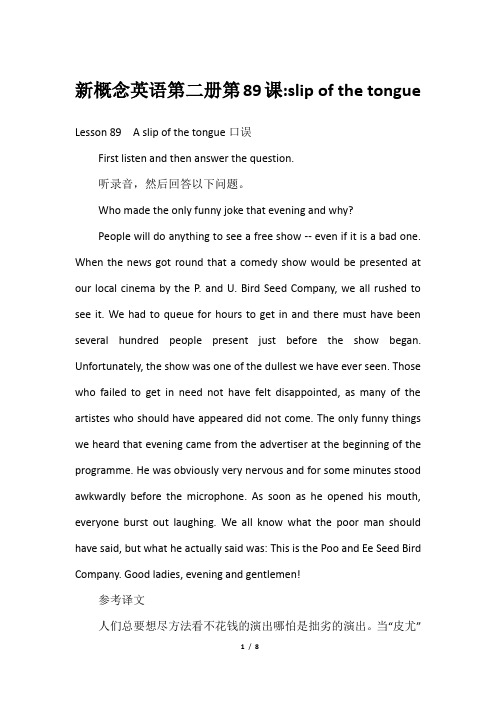
新概念英语第二册第89课:slip of the tongueLesson 89 A slip of the tongue口误First listen and then answer the question.听录音,然后回答以下问题。
Who made the only funny joke that evening and why?People will do anything to see a free show -- even if it is a bad one. When the news got round that a comedy show would be presented at our local cinema by the P. and U. Bird Seed Company, we all rushed to see it. We had to queue for hours to get in and there must have been several hundred people present just before the show began. Unfortunately, the show was one of the dullest we have ever seen. Those who failed to get in need not have felt disappointed, as many of the artistes who should have appeared did not come. The only funny things we heard that evening came from the advertiser at the beginning of the programme. He was obviously very nervous and for some minutes stood awkwardly before the microphone. As soon as he opened his mouth, everyone burst out laughing. We all know what the poor man should have said, but what he actually said was: This is the Poo and Ee Seed Bird Company. Good ladies, evening and gentlemen!参考译文人们总要想尽方法看不花钱的演出哪怕是拙劣的演出。
89新概念英语第二册89课PPT课件
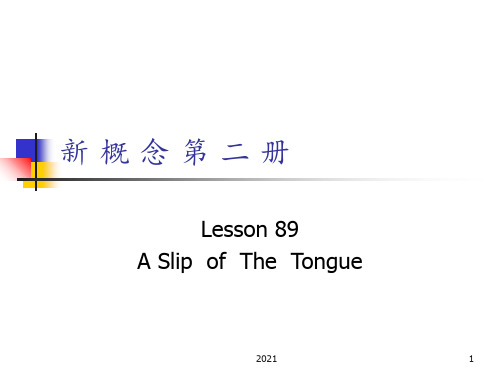
A.mayn’t
B. can’t
C. mustn’t
D. needn2’0t21
18
经典例题解析
Mr. White _____ at 8:30 for the meeting , but he didn’t’ show up.
A. should have arrived [解析]本题中的一个关键词but暗示了“Mr. White按道理理
应到了,而他没有到”。故答案选[A]。
As you workБайду номын сангаасd late yesterday, you_________ have come
this morning.
A. mayn’t
B. can’t C. mustn’t D. needn’t
[解析] He needn't have come,表示“他本没有必要来(实
译文:我们不得不排了好几个小时才进得场去。在 演出开始前场内肯定已有好几百人了。
queue 可以作不及物动词,表示“排队”queue通 常为纵队: We had to queue for hours to get in. 我们不得不排了好几个小时队才进了场内。
She has to queue for the bus every morning. 她每天早上都得排队等公共汽车。(通常与for 连 用)
新概念第二册
Lesson 89 A Slip of The Tongue
2021
1
【New words and expressions】 生词和短语
slip n. 小错误 comedy n. 喜剧 present v. 演出;adj. 出席,到场的 queue v. 排队 dull adj. 枯燥,无味 artiste n. 艺人 advertiser n. 报幕员
教学89课新概念英语第二册
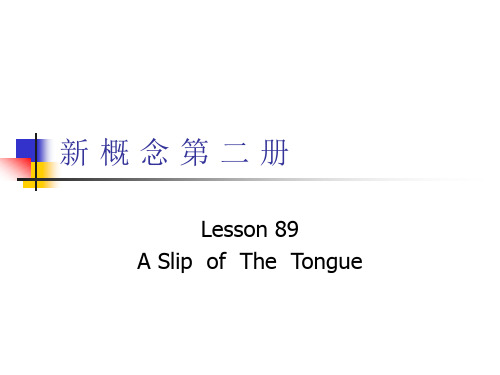
改错 (仅仅一处错误)
6. The poor man needs a house to live . ______ 7. His clothes have washed by his mother . ________ 8. He said that he had been to Beijing for many years . _______
ห้องสมุดไป่ตู้错
6. The poor man needs a house to live . ______ 7. His clothes have washed by his mother . ________ 8. He said that he had been to Beijing for many years . _______
新概念第二册
Lesson 89 A Slip of The Tongue
百词测验
70 -- 80
70
1 bullfight ['bulfait] n.斗牛 2 drunk [drʌŋk] n.醉汉 3 wander ['wɔndə, 'wɑ:n:dər] v.溜达,乱走 4 ring [riŋ] n.圆形竞技场地 5 unaware [ˌʌnə'weə] a.不知道的,示觉察的 6 bull [bul] n.公牛 7 matador ['mætədɔ:] n.斗牛士 8 remark [ri'mɑ:k] n.评论;言语
recite the text 88
Six men have been trapped in a mine for seventeen hours. If they are not brought to the surface soon they may lose their lives. However, rescue operations are proving difficult. If explosives are used, vibrations will cause the roof of the mine to collapse. Rescue workers are therefore drilling a hole on the north side of the mine. They intend to bring the men up in a special capsule.
教学89课新概念英语第二册
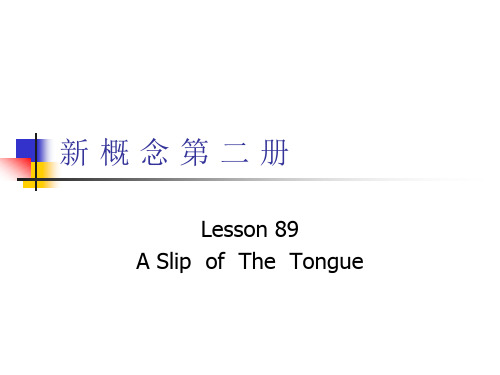
改错 (仅仅一处错误)
6. The poor man needs a house to live . ______ 7. His clothes have washed by his mother . ________ 8. He said that he had been to Beijing for many years . _______
语法选择题
7. I saw him __________ into the small store. A. went B. going C. to go D. has gone 8. He turned off the light and then _______________. A. leaves B. has left C. will leave D. left 9. We ____________the work by six yesterday evening. A. finished B. would finish C. had finished D. had been finished
72
1 2 3 4 5 6 7
racing ['reisiŋ] n.竞赛 per [pə:] prep.每 Utah ['ju:tɑ:] n.犹他(美国州名) horsepower['hɔ:sˌpauə] n.马力 burst [bə:st] v.爆裂 average ['ævəridʒ] a.平均的 footstep ['futstep] n.足迹
70
9 apparently [ə'pærəntli] ad.明显地 10 sensitive ['sensitiv] a.敏感的 11 criticism ['kritisizəm] n.批评 12 charge [tʃɑ:dʒ] v.冲上去 13 clumsily ['klʌmzili] ad.笨拙地 14 bow [bau] v.鞠躬 15 safety ['seifti] n.安全地带 16 sympathetically [ˌsimpə'θetikəli] ad.同情地
新概念二NCE2_Lesson89(共32页)

(5)the show was one of the dullest we have ever seen.
译文:这是我们看过的最乏味的演出了。
主语+ be + one of the +最高级 +复数名词+in/of, 表示" 最……的……之一"。 The Yellow River is one of the longest rivers in China. 黄河是中国最长的河流之一。 The book is one of the most interesting I have ever read. 这是我看过的最有趣的书。
译文:当皮尤鸟食公司将在我们当地影院演出喜剧节目的消 息传开后,我们都赶紧跑去观看。
(1)when 引导的这个时间状语从句中含有一个同位语从 句,即the news that...。由于that 引导的同位语从句较长, 便与它所修饰的news 隔开了,放在谓语动词之后,以免句子 头重脚轻。同位语从句中用了被动语态的过去将来时形式。
He will do anything for the child. 为了这孩子,他干什么都愿意。
(3)When the news got round that a comedy show would be presented at our local cinema by the P. and U. Bird Seed Company, we all rushed to see it.
(4)We had to queue for hours to get in and there must have been several hundred people present just before the show began.
新概念英语89课课件
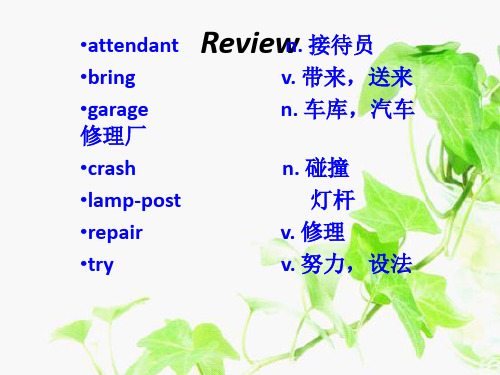
IAN:
Good afternoon. I believe that this is house is for sale. That's right.
May I …? 比较正式的提出请求。 May I come in? (first time) 较熟悉后就可说:Can I come in?
NIGEL: IAN: NIGEL: IAN:
How much does this house cost? $68,500. That’s a lot of money! It’s worth every penny of it.
25
1. decide to do sth. = make a decision to do sth. 2. make up one’s mind 下定决心
7/5/2014 (2) the plural form(trousers,shoes) + are + for sale
★retire • ① v. 退休;离职 • 不久他将退休. • He’s going to retire .
★cost v. 花费(物体做主语) • 这件外套30美元 • The coat costs $30. • 这个房子多少钱? • How much does this house cost? • Pay for……人做主语 • 我花了30美元买这件外套。 • I paid $30 on this coat. • Spend on • 他花很多钱用于买书 • He spends a lot of money on books.
for sale n. 待售
1.The coat is for sale. 2.The handbag is for sale. 3.The shoes are for sale. 4.The trousers are for sale.
新概念英语第二册第89课-slip of the tongue
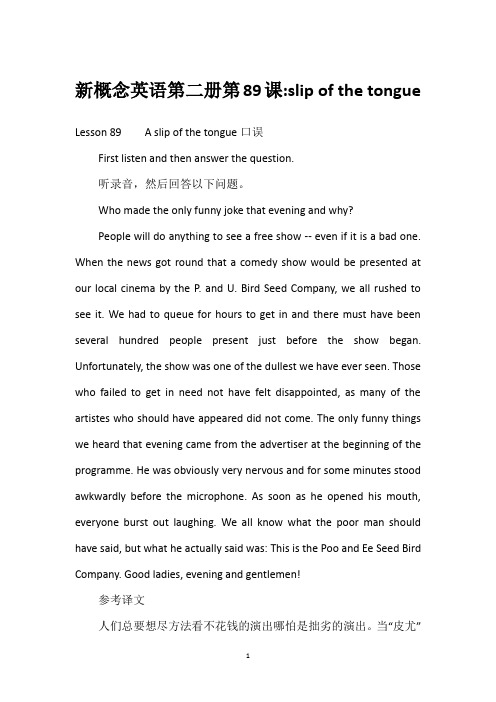
新概念英语第二册第89课:slip of the tongueLesson 89 A slip of the tongue口误First listen and then answer the question.听录音,然后回答以下问题。
Who made the only funny joke that evening and why?People will do anything to see a free show -- even if it is a bad one. When the news got round that a comedy show would be presented at our local cinema by the P. and U. Bird Seed Company, we all rushed to see it. We had to queue for hours to get in and there must have been several hundred people present just before the show began. Unfortunately, the show was one of the dullest we have ever seen. Those who failed to get in need not have felt disappointed, as many of the artistes who should have appeared did not come. The only funny things we heard that evening came from the advertiser at the beginning of the programme. He was obviously very nervous and for some minutes stood awkwardly before the microphone. As soon as he opened his mouth, everyone burst out laughing. We all know what the poor man should have said, but what he actually said was: This is the Poo and Ee Seed Bird Company. Good ladies, evening and gentlemen!参考译文人们总要想尽方法看不花钱的演出哪怕是拙劣的演出。
新概念英语第二册课件 Lesson 89 — 90

skate n. 鳐 factor n. 因素 crew n. 全体工作人员
Questions on the text
Language points
…as the oceans have been overfished, fish has become more and more expensive. More and more people are going on diet. They began to dance, slowly at first, then more and more quickly.
So it comes as a surprise to learn that giant fish are terrifying the divers on North Sea oil rigs.
…divers…have been frightened out of their wits by giant fish bumping into them as they work.
chip n. 油煎土豆片 overfish v.过度捕捞 giant adj. 巨大的
terrify v. 使恐怖
diver n. 潜水员
oil rig 石油钻塔
wit n. (复数) 理智, 头脑 cage n. 笼 shark n. 鲨鱼 whale n. 鲸 variety n. 品种 cod n. 鳕
Now they have had special cages made to protect them from these monsters. I’ll have my clothes washed.
He’s going to have his car repaired.
- 1、下载文档前请自行甄别文档内容的完整性,平台不提供额外的编辑、内容补充、找答案等附加服务。
- 2、"仅部分预览"的文档,不可在线预览部分如存在完整性等问题,可反馈申请退款(可完整预览的文档不适用该条件!)。
- 3、如文档侵犯您的权益,请联系客服反馈,我们会尽快为您处理(人工客服工作时间:9:00-18:30)。
• that引导的同位语从句较长,便与它所修饰 的news隔开了,放在谓语动词之后,以免 句子头重脚轻。同位语从句中用了被动语 态的过去将来时形式。
• (2)get round在这里表示消息、谣言等 “传开”(也可以用get around/about):
• 我觉得那个包裹有点古怪,所以就给警察 打了电话。
• This morning I saw her wearing a funny hat which looked like a lightouse.
• 今天上午我看见她戴了一顶滑稽的、看上 去像个灯塔的帽子。
放映结束 感谢各位批评指导!
谢 谢!
• 用should+have+过去分词表示过去应当做 而并没有做的事时,它后面经常跟but
• (actually)以形成对比:
• I should have left home before 9 o'clock, but actually I didn't.
• 我本该在9点以前离开家,但实际上我没有。
• The word s buried treasure in that cave.
• 那个洞里有宝藏的消息很快便传开了。 • Bad news gets round quickly. • 坏消息传得快。
• 4.…there must have been several hundred people present just before the show began.……在演出开始前场内肯定 已有好几百人了。
• You needn't have told him about my plans.
• 你本不必把我的打算告诉他。(实际上已 告诉了他)
• He should have gone along a side street.
• 他应该走一条小街。(实际上他走了主要 街道)
• 5.As soon as he opened his mouth, everyone burst out laughing.
• 但他刚一开口说话,人们便哄堂大笑起来。 • burst out为固定短语,其含义之一为“突
然……起来”,后面通常接动名词,也可 以接in/into+名词:
• At the sight of the drunk, everyone burst out laughing/in laughter.
• 一看见那醉汉,大家便大笑起来。
modern cities. • 现代城市里单身女人越来越多了。 • a single parent • 单亲(独自一人养育儿女的父亲或母亲)
• 2.queue与row • (1)queue可以作 • 不及物动词,表示“排队”:
• We had to queue for hours to get in. • 我们不得不排了好几个小时队才进了场内。
• She has to queue for the bus every morning.
• 她每天早上都得排队等公共汽车。 • (通常与for连用)
• queue也可以作名词,表示按顺序等待的人、 车等的“行列”、“队”:
• There's a long queue/line of people waiting for the bus.
• 3.When the news got round that a comedy show would be presented at
our local cinema by the P. and U. Bird Seed Company…当“皮尤”鸟食公司将 在我们当地影院演出喜剧节目的消息传开 后……
• 你可以在这张老照片中找到我,我当时站 在后排。
• Please put the desks in four rows. • 请把课桌摆成4排。
• 3.funny adj. • (1)funny通常表示“有趣的”、“滑稽
的”、“逗人发笑的”,与amusing同义:
• I don't find Jim's jokes very funny. • 我并不觉得吉姆的笑话很有趣。
• 那姑娘每星期“送”她母亲一件免费的衣 服!
• She has got some free tickets to the comedy show.
• 她有这场喜剧表演的一些免费入场券。
• free还可以表示“自由的”、“没束缚的”、 “不受控制的”、“空闲的”等含义:
• You are free to make your own decision. • 你有权作出自己的决定。
• must+have+过去分词 • 表示对过去发生的事进行推测(其否定式 • 为can't+have+过去分词); • need+have+过去分词 • 表示过去不必做但实际已做了的事 • should/ought to+have+过去分词 • 表示本来应该做而实际未做的事
• He had found five empty whisky bottles which the ghost must have drunk the night
• I'm free on Friday evening. • 我星期五晚上有空。
• (2)single可以指人“单身的”、“独身 的”、“未婚的”:
• I enjoy being single. • 我喜欢独身生活。 • Are you married or single? • 你结婚了还是单身? • There are more and more single women in
• before. • 他发现了5只空的威士忌酒瓶子,这肯定是
鬼魂前天晚上喝的。
• The examiner must have been pleased with my performance.
• 主考人对我的表现想必是满意的。
• You needn't have said that. • 你没必要这么说。(实际已经说了)
让我们共同进步
• He included a large number of funny stories in his speech.
• 他在演讲词里面加进了大量逗人的故事。
• (2)在口语中,funny也可以表示“反常 的”、“古怪的”、“奇怪的”等含义:
• I thought there was something funny about the parcel, so I phoned the police.
• When he was nervous, he would sometimes make a slip of tongue.
• 当他紧张时,他有时就会发生口误。
• Are you sure that it was just a slip of tongue?
• 你确信那只是一时口误吗?
• 2.People will do anything to see a free show…人们总要想尽办法去看不花钱的演
• When she heard that her father had died in the accident, she burst out crying.
• 当她听说她父亲在那次事故中丧生时便大 哭起来。
• 6.We all know what the poor man should have said, but what he actually said was…我 们都明白那个可怜的应该说些什么,而他实际说 的却是……
• 出…… • anything用肯定句时表示“不论什么”、
“任何事情”,to see a free show表示目 • 的,也可以用for+名词形式:
• He will do anything to save his child's life. • 他要想尽办法挽救他孩子的生命。
• He will do anything for the child. • 为了这孩子,他干什么都愿意。
Lesson 89
A slip of the tongue 口误
• 1.A slip of the tongue说走了嘴,失言。
• slip在这里表示“不经心的错误”、“失误”、 “疏漏”:
• You've made some slips (of the pen) in your report.
• 你的报告中有一些小错(笔误)。
• Those who failed to get in need not have felt disappointed, as many of the artistes who should have appeared did not come.
• 那些没能进到场内的人没有必要感到失望, 因为很多应该出场的专业演员都没有来。
• 人们排着长队等公共汽车。
• We'd better join the queue for tickets. • 我们最好加入买票的队伍。
• (2)row可以指人或物的 • “一排”、“一行”,通常为横的(queue
通常为纵队):
• You can see me in this old photo, standing in the back row.
• You should have written the word‘too’, but what you actually wrote was‘to’.
• 你本该写“too”,但实际上你却写了“to”。
• (1)free可以表示“免费的”、“无偿 的”:
